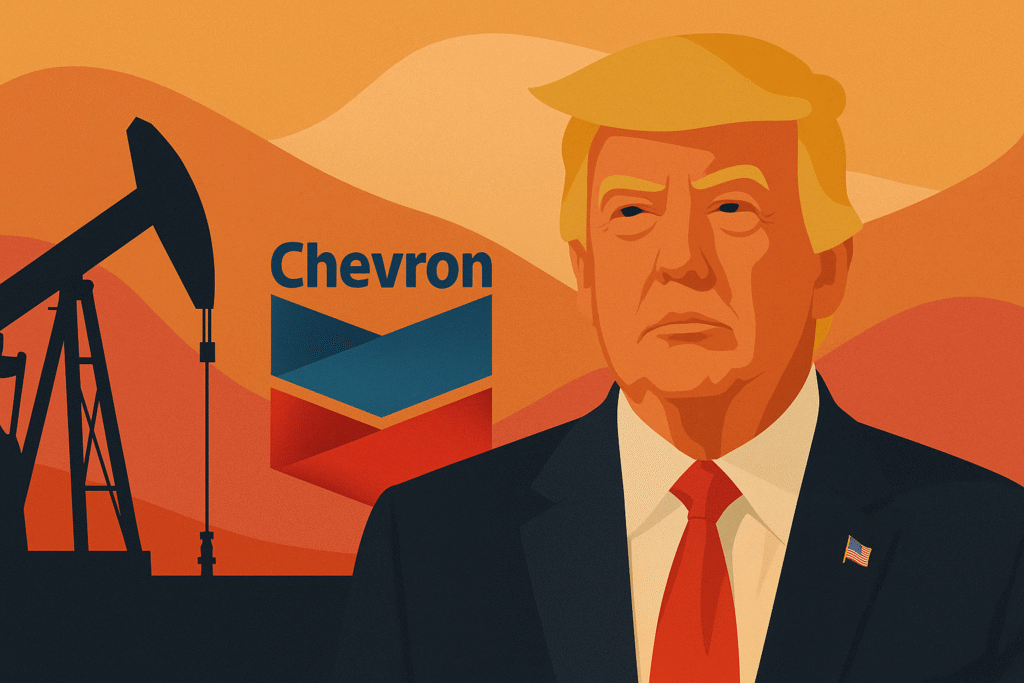In a significant shift in U.S. foreign policy towards Venezuela, the Trump administration has reversed its previous decision and granted Chevron permission to resume oil production and exports from the South American country. This move softens the administration’s earlier hardline approach towards the authoritarian government of President Nicolás Maduro.
The new licence allows Chevron, which had operated in Venezuela through joint ventures with state oil company PDVSA, to restart operations halted earlier due to sanctions. Prior to the suspension, Chevron had been producing approximately 240,000 barrels per day — nearly a quarter of Venezuela’s total oil output.
Context and Reversal
The decision comes just five months after the Trump administration had revoked Chevron’s license over human rights concerns. The Biden administration had originally granted the licence, which drew sharp criticism from the Venezuelan opposition and former President Trump, who stated on Truth Social:
“We are hereby reversing the concessions that Crooked Joe Biden gave to Nicolás Maduro, of Venezuela.”
Sources familiar with the matter indicated that the new licence will remain in effect for six months, without automatic renewal, and will allow the Venezuelan government to be compensated in oil rather than cash for royalties and taxes.
Foreign Policy Implications
The reversal underscores the transactional and sometimes contradictory nature of U.S. policy under President Trump. While maintaining a public stance against the Maduro regime, the administration has quietly engaged in negotiations involving energy and migration. This approach has sparked internal debate, with Secretary of State Marco Rubio leading a more hawkish faction, while presidential envoy Richard Grenell has advocated pragmatic deals with Caracas.
A senior State Department official noted that although the U.S. does not intend for the Maduro regime to profit from oil sales, no specific comment was made regarding Chevron’s licence.
Tied to Recent Developments
This policy shift follows a prisoner exchange agreement last week, which resulted in the release of 10 U.S. citizens held in Venezuela. In return, the U.S. repatriated 250 Venezuelan migrants via El Salvador. While officials deny any direct link between the licence and the exchange, analysts suggest the two developments are likely connected.
Michael Shifter, former president of the Inter-American Dialogue, stated:
“It was probably naive to believe that Maduro would release U.S. hostages without Chevron getting a licence to restart operations in return. This marks the latest flip-flop in the Trump administration’s energy and Venezuela policy.”
Political Timing
Analysts also highlight the political context of the decision. Following the successful passage of Trump’s flagship tax legislation — which required support from Republican lawmakers, particularly those from Florida who favor a tough stance on Venezuela — the administration may now feel free to ease sanctions.
Kevin Book, managing director at ClearView Energy Partners, remarked:
“Venezuela sanctions may have been the price of three Florida votes back in May, but Trump’s big beautiful bill became the law of the land on July 4.”
Chevron’s Position
Chevron, in a formal statement, emphasized its commitment to compliance with all applicable laws and sanctions regimes, including those governing operations in Venezuela.
The Venezuelan government has not yet issued an official response to the development.


